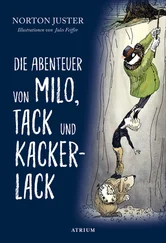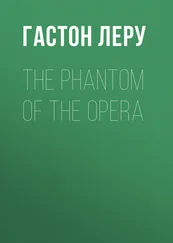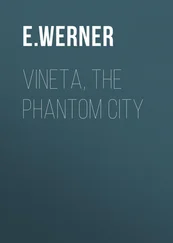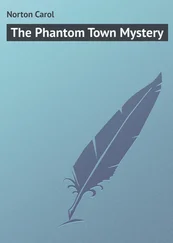Suddenly there were seven Mathemagicians standing side by side, and each one looked exactly like the other.
“How did you do that?” gasped Milo.
“There’s nothing to it,” they all said in chorus, “if you have a magic staff.” Then six of them canceled themselves out and simply disappeared.
“But it’s only a big pencil,” the Humbug objected, tapping at it with his cane.
“True enough,” agreed the Mathemagician; “but once you learn to use it, there’s no end to what you can do.”
“Can you make things disappear?” asked Milo excitedly.
“Why, certainly,” he said, striding over to the easel. “Just step a little closer and watch carefully.”
After demonstrating that there was nothing up his sleeves, in his hat, or behind his back, he wrote quickly:
4 + 9 − 2 × 16 + 1 ÷ 3 × 6 − 67 + 8 × 2 − 3 + 26 − 1 ÷ 34 + 3 ÷ 7 + 2 − 5 =
Then he looked up expectantly.
“Seventeen!” shouted the bug, who always managed to be first with the wrong answer.
“It all comes to zero,” corrected Milo.
“Precisely,” said the Mathemagician, making a very theatrical bow, and the entire line of numbers vanished before their eyes. “Now is there anything else you’d like to see?”
“Yes, please,” said Milo. “Can you show me the biggest number there is?”
“I’d be delighted,” he replied, opening one of the closet doors. “We keep it right here. It took four miners just to dig it out.”
Inside was the biggest  Milo had ever seen. It was fully twice as high as the Mathemagician.
Milo had ever seen. It was fully twice as high as the Mathemagician.
“No, that’s not what I mean,” objected Milo. “Can you show me the longest number there is?”
“Surely,” said the Mathemagician, opening another door. “Here it is. It took three carts to carry it here.”
Inside this closet was the longest  imaginable. It was just about as wide as the three was high.
imaginable. It was just about as wide as the three was high.
“No, no, no, that’s not what I mean either,” said Milo, looking helplessly at Tock.
“I think what you would like to see,” said the dog, scratching himself just under half-past four, “is the number of greatest possible magnitude.”
“Well, why didn’t you say so?” said the Mathemagician, who was busily measuring the edge of a raindrop. “What’s the greatest number you can think of?”
“Nine trillion, nine hundred ninety-nine billion, nine hundred ninety-nine million, nine hundred ninety-nine thousand, nine hundred ninety-nine,” recited Milo breathlessly.
“Very good,” said the Mathemagician. “Now add one to it. Now add one again,” he repeated when Milo had added the previous one. “Now add one again. Now add one again. Now add one again. Now add one again. Now add one again. Now add one again. Now add——”
“But when can I stop?” pleaded Milo.
“Never,” said the Mathemagician with a little smile, “for the number you want is always at least one more than the number you’ve got, and it’s so large that if you started saying it yesterday you wouldn’t finish tomorrow.”
“Where could you ever find a number so big?” scoffed the Humbug.
“In the same place they have the smallest number there is,” he answered helpfully; “and you know what that is.”
“Certainly,” said the bug, suddenly remembering something to do at the other end of the room.
“One one-millionth?” asked Milo, trying to think of the smallest fraction possible.
“Almost,” said the Mathemagician. “Now divide it in half. Now divide it in half again. Now divide it in half again. Now divide it in half again. Now divide it in half again. Now divide it in half again. Now divide——”
“Oh dear,” shouted Milo, holding his hands to his ears, “doesn’t that ever stop either?”
“How can it,” said the Mathemagician, “when you can always take half of whatever you have left until it’s so small that if you started to say it right now you’d finish even before you began?”
“Where could you keep anything so tiny?” Milo asked, trying very hard to imagine such a thing.
The Mathemagician stopped what he was doing and explained simply, “Why, in a box that’s so small you can’t see it—and that’s kept in a drawer that’s so small you can’t see it, in a dresser that’s so small you can’t see it, in a house that’s so small you can’t see it, on a street that’s so small you can’t see it, in a city that’s so small you can’t see it, which is part of a country that’s so small you can’t see it, in a world that’s so small you can’t see it.”
Then he sat down, fanned himself with a handkerchief, and continued. “Then, of course, we keep the whole thing in another box that’s so small you can’t see it—and, if you follow me, I’ll show you where to find it.”
They walked to one of the small windows and there, tied to the sill, was one end of a line that stretched along the ground and into the distance until completely out of sight.
“Just follow that line forever,” said the Mathemagician, “and when you reach the end, turn left. There you’ll find the land of Infinity, where the tallest, the shortest, the biggest, the smallest, and the most and the least of everything are kept.”
“I really don’t have that much time,” said Milo anxiously. “Isn’t there a quicker way?”
“Well, you might try this flight of stairs,” he suggested, opening another door and pointing up. “It goes there, too.”
Milo bounded across the room and started up the stairs two at a time. “Wait for me, please,” he shouted to Tock and the Humbug. “I’ll be gone just a few minutes.”
Up he went—very quickly at first—then more slowly—then in a little while even more slowly than that—and finally, after many minutes of climbing up the endless stairway, one weary foot was barely able to follow the other. Milo suddenly realized that with all his effort he was no closer to the top than when he began, and not a great deal further from the bottom. But he struggled on for a while longer, until at last, completely exhausted, he collapsed onto one of the steps.
“I should have known it,” he mumbled, resting his tired legs and filling his lungs with air. “This is just like the line that goes on forever, and I’ll never get there.”
“You wouldn’t like it much anyway,” someone replied gently. “Infinity is a dreadfully poor place. They can never manage to make ends meet.”
Milo looked up, with his head still resting heavily in his hand; he was becoming quite accustomed to being addressed at the oddest times, in the oddest places, by the oddest people—and this time he was not at all disappointed. Standing next to him on the step was exactly one half of a small child who had been divided neatly from top to bottom.

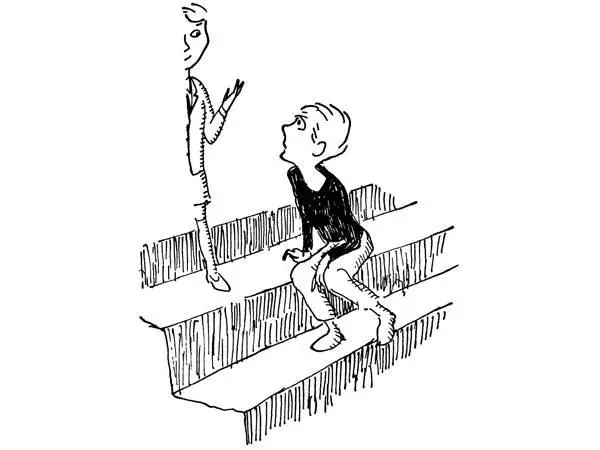
“Pardon me for staring,” said Milo, after he had been staring for some time, “but I’ve never seen half a child before.”
“It’s .58 to be precise,” replied the child from the left side of his mouth (which happened to be the only side of his mouth).
“I beg your pardon?” said Milo.
“It’s .58,” he repeated; “it’s a little bit more than a half.”
Читать дальше
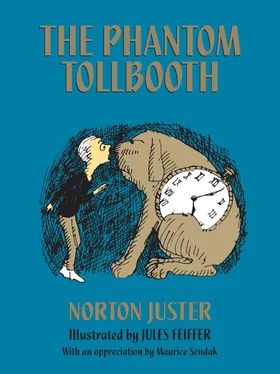
 Milo had ever seen. It was fully twice as high as the Mathemagician.
Milo had ever seen. It was fully twice as high as the Mathemagician. imaginable. It was just about as wide as the three was high.
imaginable. It was just about as wide as the three was high.


